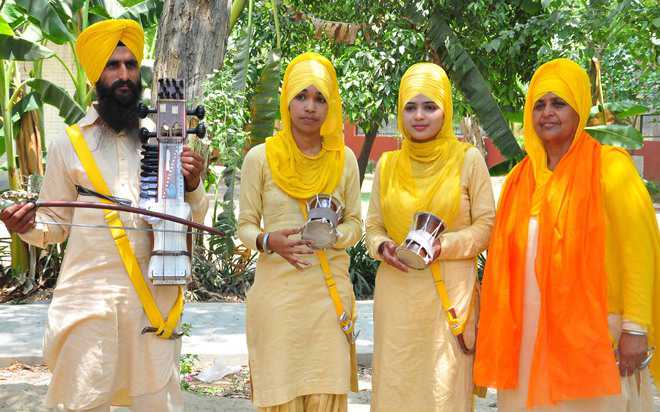Bharat Khanna
Tribune News Service
Bathinda, March 8
Women ‘dhadi jathas’ (a team of four), comprising baptised Sikh women and a male ‘sarangi’ player, that sings ballads of Sikh Gurus and heroes of the community have become quite popular across the state.
They perform on stages of gurdwaras, at religious programmes and sometimes at events of political parties.
While a ‘dhadi jatha’ represented by Surinder Kaur Kulehri from Mansa comprises three women, some other women ‘dhadi jathas’ have two members.
In a ‘jatha’, one of the women sings ‘Vaars’ (heroic ballads) while the other follows her and narrates the history in musical form on the stage.
Playing ‘sarangi’ and hourglass, along with singing of ballads, became a passion for Surinder Kaur.
However, it was disapproved by her parents and later by her in-laws in the early eighties.
Nevertheless, she fought all odds and convinced her in-laws for her passion.
She started singing ballads onstage in the beginning of the 21st century.
She performed for the first time in 2002 on the stage of Takht Damdama Sahib, Talwandi Sabo, on Vaisakhi.
“Since 2002, our ‘jatha’ has performed on various stages. In the southern part of Malwa that comprises Bathinda, Mansa, Sangrur, Faridkot and others districts, ours is the only ‘jatha’ in which a woman delivers lecture, narrates history and explains the meaning between the lines. In the Doaba region, there a many groups or ‘jathas’ of women, but in this cotton belt, there are few such groups,” she said.
“However, the tradition could be traced back to ‘Nabhaewali Beebian’ who were famous for singing ballads. Dhadhis like Darshan Singh Daler, Ranjit Singh Mander and Balvir Singh Ball are our idols,” added Surinder Kaur.
“Now, we have a family of dhadis, including my son Mandeep Singh, a sarangi player, and daughter in-law Paramjit Kaur who sings. My nephew Balkaran Singh also plays sarangi and is part of our team. My husband and sons are farmers. In the last couple of years, we have performed on various stages of Punjab, Haryana, Rajasthan and Kolkata where sangat invites us,” she said.
Passionate for singing ballads, two students from TPD College are new members in Surinder Kaur’s Jatha, who, besides pursuing their BA degree, perform on the stage.
Simranjit Kaur, a student at GKU, Talwandi Sabo, in Surinder Kaur’s ‘jatha’, is passionate for singing the ballads on stage.
“My father is a ‘raagi’ at Gurdwara Sahib. He encouraged me to sing ballads. He took me to raagi Darshan Singh Daler, who gave me the first nuances. From around last two months, I have been singing ballads with Manpreet Kaur. These days, I have taken a break from the ‘jatha’ for recording of my song,” Simranjit said.
“The word ‘dhadi’ — a bard — is used several times in Guru Granth Sahib. Guru Nanak called himself ‘Dhadi of God’. Guru Hargobind, the sixth Guru, promoted the ‘dhadi’ art and transformed its tradition of singing praise of landlords or rulers of that time to singing the praise of God and then composed the text of Gurbani. Later, contemporary ‘dhadis’ began singing heroic ballads of Sikh warriors known as ‘Vaars’ to motivate the community,” added Simranjit Kaur.
Many ‘dhadis’, including Tarsem Singh Moranwali, Sohan Singh Sheetal, Hardev Singh Muktsar, Pal Singh Panchi, Master Bohar Singh, Tehel Singh Bhuttiwala, Bali Singh Balan, Ujagar Singh Muktsar, Ajit Singh Boharwal and others have had their names recorded in the gallery of ‘dhadi’ artistes.
Unlock Exclusive Insights with The Tribune Premium
Take your experience further with Premium access.
Thought-provoking Opinions, Expert Analysis, In-depth Insights and other Member Only Benefits
Already a Member? Sign In Now










